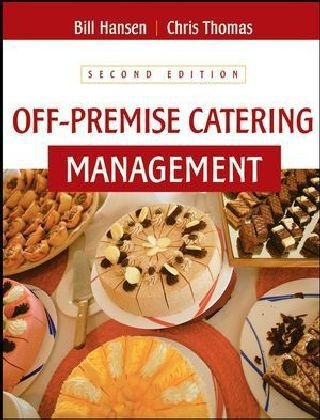
Off-Premise Catering Management
John Wiley & Sons Inc (Verlag)
978-0-471-46424-2 (ISBN)
- Titel erscheint in neuer Auflage
- Artikel merken
Off-Premise Catering Management, Second Edition is the updated edition of the NACE-recommended guide to planning, executing, and managing an off-premise catering management business. The book presents profiles of off-premise catering companies and sole proprietors from both large and small operations. It includes many useful forms and checklists throughout the planning and execution stages of the event and offers extended coverage of marketing off-premise catering businesses.
Bill Hansen is President of Bill Hansen Catering in Miami, Florida, and the founder and CEO of Leading Caterers of America, a Web site that provides resources for caterers and catering customers. He has taught catering courses at Florida International University since 1990 and teaches Bill Hansen Catering Boot Camps across the United States. Chris Thomas is a professional writer who specializes in food and wine topics.
Preface. Chapter 1: Introduction to Off-Premise Catering Management. Comparing Off-Premise and On-Premise Catering. Advantages and Disadvantages of Off-Premise Catering. Elements of Successful Off-Premise Catering. Managing an Off-Premise Catering Operation. Personal Management. Looking Ahead-Catering in the Future. The Seven Habits of Highly Successful Caterers. How Does an Off-Premise Caterer Gauge Success? The Off-Premise Catering Model. Conclusion. Chapter 2: Getting Started-Laws, Locations, and Contracts. Local and State Requirements. Federal Requirements. Legal Forms of Operation. The Family-Owned Business. Finding a Facility. Selecting a Catering Commissary. Funding Alternatives. Catering Contracts. Deposits, Cancellations, and Refunds. Deposit Policy. How to Survive a Lawsuit. Conclusion. Chapter 3: Menu Planning. Planning Principles. Basic Menu Categories. Catering Menus. Dietary and Nutritional Claims. Types of Menus. Basic Menu Planning Guidelines. Food Presentation. Culinary Trends. Computing Food Quantities. Calculating Food Cost. Leftovers. Conclusion. Chapter 4: Beverage Service. State and Local Liquor Laws. Liquor Laws and Legal Liability. Responsible Alcohol Service. An Introduction to Beverages. Appellation Systems. Wines of the World-A (Very) Short Course. Beer. Water. Soft Drinks. Figuring Beverage Quantities. Basic Drink Recipes for Off-Premise Caterers. Beverage Stations (Bars). Conclusion. Chapter 5: Catering Equipment. Determining Equipment Needs. Equipping a Catering Commissary. Basic Commissary Equipment. Transporting Food and Equipment. Back-of-the-House Equipment. Front-of-the-House Equipment. Miscellaneous Other Equipment and Supplies. Equipment Decisions: To Buy or to Rent? Dealing with Rental Companies. Effective Purchasing. Equipment Trends. Conclusion. Chapter 6: Logistics of Off-Premise Catering. Scouting Unique Party Locations. Site Inspections. Planning and Designing the Catered Event. Layout and Design Criteria. Rental Order Forms and Party Packing Lists. Food Production Sheets. Getting the Goods to the Party. Conclusion. Chapter 7: Human Resources. Federal Laws. Department of Labor-Enforced Laws. EEOC-Enforced Laws. State-Enforced Laws. Determining Staff Levels. Recruiting Workers. Interviewing and Hiring Staff. Paying Catering Staff. Employee Benefits. Orientation and Training. Motivating Workers. Employee Turnover. Performance Reviews. Discipline and Termination. The Employee Handbook. Conclusion. Chapter 8: The Show. Supervising and Managing. Setting Up for Meal Service. Serving Procedures. Buffets and Food Stations. Handling Complaints. Conclusion. Chapter 9: Marketing. Catering Markets. Developing a Marketing Plan. The Marketing Budget. Marketing Tools. The Marketing Plan. Selling to Shoppers and Buyers. Closing the Sale. Conclusion. Chapter 10: Pricing Off-Premise Catered Events. Pricing for Profit. Pre-Costing Catered Events. Pricing Food. Pricing Labor. Pricing a Party. Service Charges, Gratuities, and Sales Taxes. Conclusion. Chapter 11: Purchasing, Receiving, and Storing Foods. Purchasing. Receiving. Storage. Payment Policies. Conclusion. Chapter 12: Sanitation and Safety. Food Storage. Preparing and Serving Food. Handling Customer Complaints. On-the-Job Safety. Government Agencies and Regulations. Security Procedures. Insurance Coverage. Conclusion. Chapter 13: Accessory Services and Special Requirements. Accessory Services. Themes and Theme Parties. Kosher Catering and Bar/Bat Mitzvahs. Weddings and Receptions. Conclusion. Chapter 14: Budgeting, Accounting, and Financial Management. Preparing a Budget. Start-Up Expenses. Cash Budgets. Break-Even Points. Accounting for Revenue and Expenses. Chart of Accounts. Income Statement Summary. The Income Statement. The Balance Sheet. Analyzing Financial Statements. Controlling Costs. Computers in Catering. Managing Money. Credit Card Processing Services. Federal Taxes. Conclusion. Index.
| Erscheint lt. Verlag | 20.1.2005 |
|---|---|
| Zusatzinfo | Illustrations |
| Verlagsort | New York |
| Sprache | englisch |
| Maße | 196 x 241 mm |
| Gewicht | 934 g |
| Einbandart | gebunden |
| Themenwelt | Sachbuch/Ratgeber ► Essen / Trinken |
| Wirtschaft | |
| ISBN-10 | 0-471-46424-4 / 0471464244 |
| ISBN-13 | 978-0-471-46424-2 / 9780471464242 |
| Zustand | Neuware |
| Haben Sie eine Frage zum Produkt? |
aus dem Bereich



